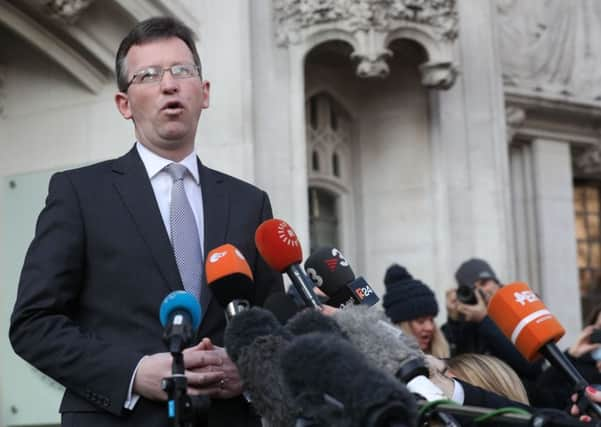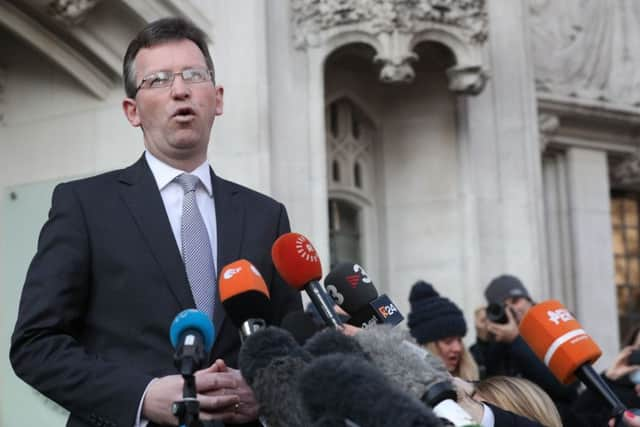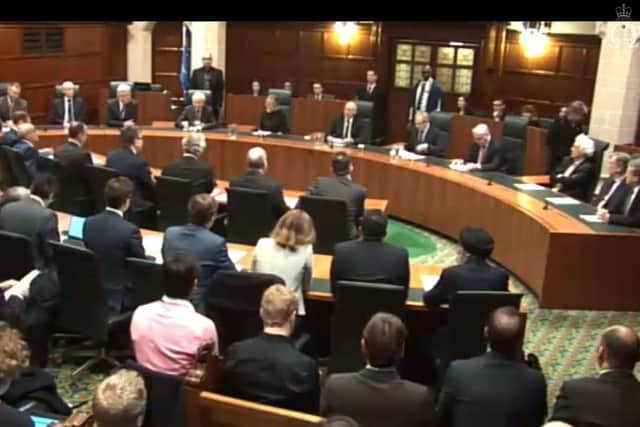MPs to get vote as government defeated over right to trigger Brexit


By a majority of eight to three, judges at the Supreme Court rejected the Government’s argument that Mrs May could use prerogative powers to trigger the talks under Article 50 of the EU treaties, but must first seek Parliament’s approval.
Ministers are now expected to publish a short bill authorising the invocation of Article 50, with votes to take place in the Houses of Commons and Lords soon.
Read more...


Advertisement
Hide AdAdvertisement
Hide AdAttorney General Jeremy Wright - who led the Government’s legal fight - said ministers were “disappointed” by the ruling, but added: “The Government will comply with the judgment of the court and do all that is necessary to implement it.”
A Downing Street spokesman said: “The British people voted to leave the EU, and the Government will deliver on their verdict - triggering Article 50, as planned, by the end of March. Today’s ruling does nothing to change that.


“It’s important to remember that Parliament backed the referendum by a margin of six to one and has already indicated its support for getting on with the process of exit to the timetable we have set out.
Advertisement
Hide AdAdvertisement
Hide Ad“We respect the Supreme Court’s decision, and will set out our next steps to Parliament shortly.”
The Supreme Court judges also ruled against an argument that Mrs May must also consult devolved administrations in Scotland, Wales and Northern Ireland before triggering Article 50.
There was relief in Downing Street over the decision on devolved administrations, which could have been much more significant in upsetting Mrs May’s timetable if it had gone the other way.


Brexit Secretary David Davis will set out the Government’s plans in detail in a statement to MPs on Tuesday afternoon.
Advertisement
Hide AdAdvertisement
Hide AdLabour leader Jeremy Corbyn said his party would not “frustrate the process for invoking Article 50” but would seek to amend the legislation to prevent the UK becoming a “bargain basement tax haven”.
“Labour is demanding a plan from the Government to ensure it is accountable to Parliament throughout the negotiations and a meaningful vote to ensure the final deal is given parliamentary approval,” said Mr Corbyn.
Leeds Central MP Hilary Benn, chairman of the Brexit select committee of MPs, called for parliament to be given a vote on the Brexit deal reached by Theresa May.


He told the BBC: “Since the European Parliament is going to have a vote, all the other member states will have a vote on any deal, well the same should be true for the UK parliament.”
Advertisement
Hide AdAdvertisement
Hide AdMr Benn said the vote should be taken when the Brexit deal is in draft form so MPs could propose changes.
He dismissed the suggestion it would amount to a ‘wreckers’ charter’ allowing MPs to stop Britain leaving the EU.
Mr Benn said: “I will vote, as I am sure a big majority of Labour MPs, to trigger Article 50 because that’s the only way in which we can respect the outcome of the referendum. We are going to be leaving the European Union, that is clear.
“The issue is what kind of relationship are we going to have with the 27 members of the EU after we have left and that is what this negotiation is all about.”
Advertisement
Hide AdAdvertisement
Hide AdAsked whether Jeremy Corbyn should force all Labour MPs to vote to trigger Article 50, Mr Benn said it was a matter for the party leadership.


Leave campaigner and Brexit select committee member Andrea Jenkyns, MP for Morley and Outwood in West Yorkshire, said she was “disappointed” at the ruling.
“The democratic vote to Leave the European Union had one of the highest voter turnouts in British history and instructed the Government to trigger Article 50,” she said.
“The British people should not have been circumnavigated, however, I am confident Parliament will uphold the referendum result and vote to trigger Article 50 before the end of March, as was indicated in the motion passed with a huge majority early in December.”
Advertisement
Hide AdAdvertisement
Hide AdThe SNP, the third largest party in the Commons, said it will put forward 50 “serious and substantive” amendments to the legislation.
Former first minister Alex Salmond said: “If Theresa May is intent on being true to her word that Scotland and the other devolved administrations are equal partners in this process, then now is the time to show it.”
Ukip leader Paul Nuttall warned MPs and peers not to hamper the passage of the legislation.
“The will of the people will be heard, and woe betide those politicians or parties that attempt to block, delay, or in any other way subvert that will,” he said.
Advertisement
Hide AdAdvertisement
Hide AdLiberal Democrats, who have just nine MPs but more than 100 peers, will vote against Article 50 unless there is a guarantee of the public having a vote on the final deal, said leader Tim Farron.
A Government source confirmed Mr Davis will announce in his statement to the Commons that he will be bringing forward legislation to permit the triggering of Article 50.
The Supreme Court ruling was welcomed by Gina Miller, the lead claimant in the case against the Government.
Speaking outside the court, she told reporters: “Only Parliament can grant rights to the British people and only Parliament can take them away.
Advertisement
Hide AdAdvertisement
Hide Ad“No government can expect to be unanswerable or unchallenged. Parliament alone is sovereign.
“This ruling today means that MPs we have elected will rightfully have the opportunity to bring their invaluable experience and expertise to bear in helping the Government select the best course in the forthcoming Brexit negotiations.”
David Greene, the lawyer for the other claimant, pro-Brexit hairdresser Deir Dos Santos, said: “The court has decided that the rights attaching to our membership of the European Union were given by Parliament and can only be taken away by Parliament.
“This is a victory for democracy and the rule of law. We should all welcome it.”
Advertisement
Hide AdAdvertisement
Hide AdThe Government’s lawyers were given physical copies of the judgment at the Supreme Court at 8am and at 9.15am the Prime Minister and Mrs Miller were told of the result.
The highest court in the land rejected an appeal by ministers against a High Court judgment blocking their decision to begin Britain’s exit from the European Union without Parliament having a say.
Supreme Court justices ruled Mrs May cannot lawfully bypass MPs and peers by using the royal prerogative to trigger the two-year process of negotiating the UK’s divorce from its EU partners.
Supreme Court President Lord Neuberger said: “By a majority of eight to three, the Supreme Court today rules that the Government cannot trigger Article 50 without an Act of Parliament authorising it to do so.”
Advertisement
Hide AdAdvertisement
Hide AdGiving a short summary of the court’s findings, Lord Neuberger said: “The issues in these proceedings have nothing to do with whether the UK should exit from the EU, or the terms or timetable for that exit.”
Explaining the majority decision, he said: “Withdrawal effects a fundamental change by cutting off the source of EU law, as well as changing legal rights.
“The UK’s constitutional arrangements require such changes to be clearly authorised by Parliament...
“The referendum is of great political significance, but the Act of Parliament which established it did not say what should happen as a result.
Advertisement
Hide AdAdvertisement
Hide Ad“So any change in the law to give effect to the referendum must be made in the only way permitted by the UK constitution, namely by an Act of Parliament.
“To proceed otherwise would be a breach of settled constitutional principles stretching back many centuries.”
Lord Neuberger said the three dissenting justices considered the Government could trigger Article 50 without an authorising Act of Parliament.
In their view “Parliament has not imposed any limitation on the Government’s prerogative power to withdraw from the Treaties”.
Advertisement
Hide AdAdvertisement
Hide AdThe court ruling stated that it was “entirely a matter for Parliament” what form the Article 50 legislation should take.
But it added that even a very brief Act would still have “momentous significance”.
“There is no equivalence between the constitutional importance of a statute, or any other document, and its length or complexity,” the judgment stated.